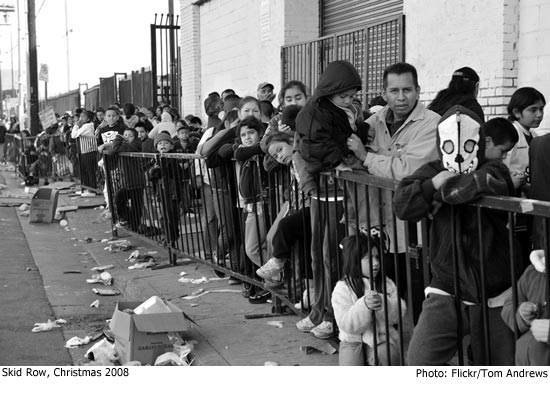Beating the holiday blues
December 16, 2010
It’s the most wonderful time of the year – or so the song goes. But stress, loneliness and other unwelcome feelings can also be as ubiquitous as red-nosed reindeer during the holidays. So what can you do if “merry and bright” isn’t exactly summing up your December?
In preparation for the season, we checked in with the Los Angeles County Department of Mental Health and its medical director, Dr. Roderick Shaner.
For most people, he says, the sources of holiday stress “seem to boil down to a couple of big things: One is concern about fellowship and being lonely. And the other is the set of expectations we have, both for the holidays and for ourselves.”
So what can you do to manage the blues and the expectations? Here’s Dr. Shaner’s advice:
1. Cut yourself some slack in the holiday spirit department.
“Unless you’re up at the North Pole making presents,” he says, “probably between 99.99% and 100% of the population experience stress around the holidays.” Feeling compelled to have the “right” frame of mind can be its own sort of holiday oppression. If your mood isn’t great, hey, you’re not alone — it’s an epidemic. Bad moods don’t get better by being taken too seriously.
2. Remember what people actually want for Christmas.
“We all remember those perfect holidays we had a long time ago, that weren’t so perfect in retrospect,” Dr. Shaner says with a laugh. “And we see in the media all these idealized versions of what we’re supposed to be in the holidays — happy, calm, making everyone feel special. Well, there are no perfect holidays. Our idealized versions are just that.” Buying into all those “shoulds”, he says, just puts you at risk of overextending yourself financially, socially, physically and emotionally — and unnecessarily. “What the people in our lives want most from us is just to see us, and know we love them, and that we have ties to them.”
3. Get real.
“Think realistically about what you’re going to be doing around the holidays, and about what you can and can’t do in terms of scheduling,” Dr. Shaner says. “Make a budget. Make some pre-holiday resolutions about the degree to which you will watch what you eat and drink, how much sleep you’ll get, how much work you’ll do. Recognize that you’ll need good rest, a reasonable schedule of exercise. And then recognize that the holidays are a time when you’ll want to give yourself a little more leeway, and resolve not to beat yourself up.”
4. Look ahead.
“We’re not going to become someone different in the last two weeks of the holiday season, but one way of dealing with the pressure of expectations is to focus on the future,” says Dr. Shaner. So think about where you want to be in the coming year. There’s a reason New Year’s resolutions are a tradition. “It’s a way to recognize not only our limitations, but also our potential. We remember that we’re all works in progress, and that makes us more hopeful and probably happier as well.”
“This is the kind of season in which human ties are most important,” says Dr. Shaner. “When we lose those, it’s easy to drift into despair.” Connect with your family. So what if the folks back home will complain that you haven’t called in six months? Or that you must admit to them that your love life or resume or show business prospects aren’t what you’d hoped for? “Your family and friends can lift your spirits, just as you’ve lifted theirs with your call,” notes Dr. Shaner. If family isn’t an option, try connecting with friends, community groups or neighbors. If seeing someone in person isn’t feasible, send cards. Or texts. Or Facebook greetings. “Actually a lot of what therapy is is helping people reach out,” says the doctor. “People think that isn’t enough, but it often is.”
6. Do something nice for someone.
“Rates of suicide and depression are higher during the holidays, and this is especially true of the poor and the homeless,” he says. “This is the time when those people are most in need of outreach and social inclusion.” You don’t have to do a lot — sometimes even a smile or a season’s greeting is plenty. But, he adds, being nice also happens to be one of the nicest things you can do for your own emotional well being. “Reaching out to people who may be more lonely and isolated is also one of the best ways to combat our own loneliness and isolation.” Ask any volunteer — serving a meal at a soup kitchen, hanging out for an afternoon with someone who’s sick or shut-in, pitching in at your place of worship or local food bank, even donating blood or giving to a good cause can make you feel surprisingly fabulous.
7. Get help if you need it.
When flu season rolls around, you get a flu shot. You call a doctor when you can’t get rid of that cold. If you’re prone to asthma or diabetes, you get regular check-ups. Mental health is just as important. Plus, it’s one of the best forms of preventative medicine on the market. So see somebody. If your insurance doesn’t cover what you need, there are teaching clinics, nonprofits, therapists who work on a sliding scale and counselors who work with faith-based organizations. Don’t know where to start? Try the Department of Mental Health’s new resource page, or its access line at (800) 854-7771. Thinking about investing in yourself for Christmas? L.A. has some of the best therapists in the country. More serious concerns? L.A.’s Suicide Prevention Center Hotline — (877) 727-4747 — has been in business for more than a half-century. “Our community has many resources that can be helpful,” says Dr. Shaner, “but ironically, it’s the stress and worry itself that often keeps people from them.”















 405 bridge work causes a stink
405 bridge work causes a stink

